By Robert St. Martin
West Los Angeles, California (The Hollywood Times) 07/30/2024
On screen at the Laemmle Royal Theatre in West Los Angeles is a powerful new film Crossing, by Georgian-Swedish director Levan Akin, who received much recognition for his previous film And Then We Danced (2019). Crossing has been recognized at various international film festivals, including the Berlinale where it was awarded the Teddy for Best LGBTQ film. Is Crossing an LGBTQ film? Not in the usual sense, but it takes us from Batumi, the Georgian beach resort town on the Black Sea, to the seedier neighborhoods of Istanbul near Beyoğlu where we encounter sex workers and trans people.
Lia, a stern-faced retired teacher, made a promise to her now-dead sister to find out what happened to her long-lost niece Tekla, who was disowned by her own mother when she decided to change her sexual identity and become a trans woman. All Lia has to go on is a name, and the fact that the now-adult child is transgender. When Lia learns from Achi, a neighbor in Batumi, that Tekla might be living in Turkey, they set off together to find her. In Istanbul they discover a beautiful city full of connections and possibilities – but looking for someone who never intended to be found is harder than they thought. They happen to meet Evrim, a lawyer fighting for trans rights. As Lia and Achi weave their way through the city’s backstreets, one thinks it possible that Tekla must be there somewhere.
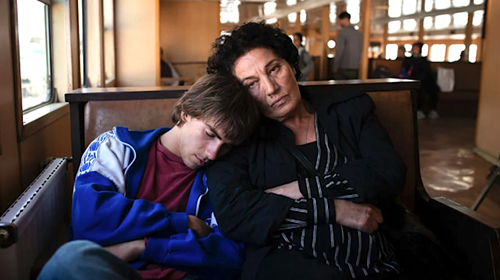
In many ways, Crossing is a film about Istanbul, a city where, like the film’s director, I have spent much time. As director Levan Akin explained in an interview: “It’s a city that, to me, represents a very transient nature, because it’s a place where different people and religions have moved in and out and therefore the neighborhoods change. The streets in Crossing where these women live have so many layers of history. For example, in the mid-1800s, it was an aristocratic neighborhood where the Greek, Byzantine, or Armenian population lived. But then they were kicked out, and the area became populated with Turkish people. A lot of Kurdish people from Eastern Anatolia moved in.”
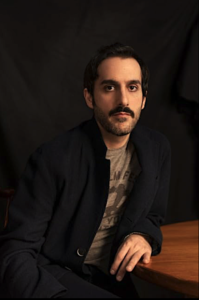
In Levan Akin’s new film, the composition and shots combined with the strong chemistry of the main characters make up for a wholesome story and, despite the seemingly tawdy neighborhoods, this film has little sexual allure. Mzia Arabuli is wonderful as the retired Georgian woman who was a teacher of history. Her character is one of the best aspects of the movie. Crossing features a well-written script that combines the modest lives of three people and reveals how these three characters have managed in their lives despite personal challenges.
The two actors who play Lia and Achi, (Mzia Arabli and Lucas Kankava), are truly impressive actors. Kankava has a wide-open face that registers Achi’s boundless naivete, which is always there no matter how cocky or obdurate he makes himself. Arabuli’s own expression as Lia is often pinched, but as time wears on her, and as she starts to let herself go in a “what the hell” sort of way – she likes to dip into a bottle of a fermented drink called “chacha,” a habit she initially tries to hide from Achi – a pained vulnerability makes itself felt. These are two lost souls who make an unlikely temporary fishbowl for themselves, far from homes they may never return to.
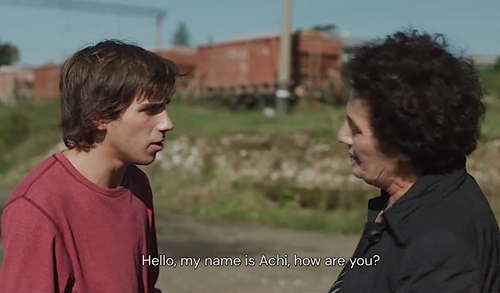
On one of their ferry rides across the waters of Istanbul, Akin’s camera makes a graceful camera move away from the anxious Lia and Achi and settles on the more content-in-the-moment face of a trans woman, whose story the movie then picks up. This is not, as is soon made clear, Tekla. The character’s name is Evrim, and she’s a woman who’s found a purpose. Near to completing a law degree, she works for a trans rights NGO that also looks into various cases in poorer neighborhoods. At one point we see her getting a young boy and his younger sister, who act on the peripheries of the movie’s central story threads, out from jail. She’s confident and compassionate, enjoys a fairly robust sex life, but she’s subject to condescension from the various authority figures she’s obliged to deal with. Deniz Dumanli’s portrayal of the character is extraordinary, grounded, vanity-free.
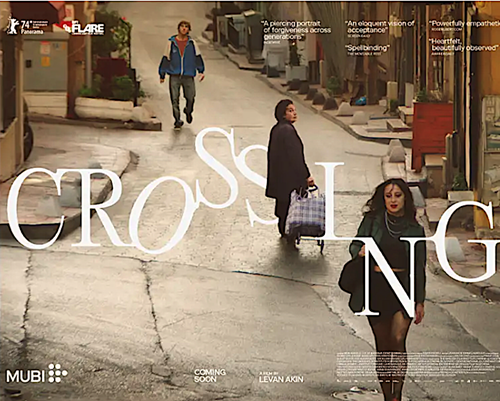
Lia and Achi’s story will intersect with Evrim’s, but not right away. Akin is here working in a tradition established in Italian Neo-realism – and by the end of the film, he shows he can tap the tears of viewers as deftly as De Sica but Akim’s narrative approach brings a vivid freshness to the proceedings. The camerawork he concocts with cinematographer Lisabi Fridell, often shooting through windows and doorways, often gives the viewer a “fly on the wall” feeling, but never becomes voyeuristic. Levan Akim has become one of Georgia’s best filmmakers, even though he chose Swedish citizenship as a gay man quite aware of Georgia’s very patriarchal and homophobic views.
The film’s title alludes, of course, to its principal action and theme, but Crossing doesn’t limit itself to a trite conflation between migration and gender transition. Lia and Achi’s literal crossing from Georgia to Turkey is underwhelming. As Achi says, “It looks exactly the same…Isn’t this a different country?” The ferry crossing over the Golden Horn, on the other hand, from one side of Istanbul to another, turns out to be quietly momentous. It’s in this scene that the film crosses perspectives, when the camera tilts up from Lia and Achi on the main deck to the observation deck above, depositing us in Evrim’s part of the story for a while.
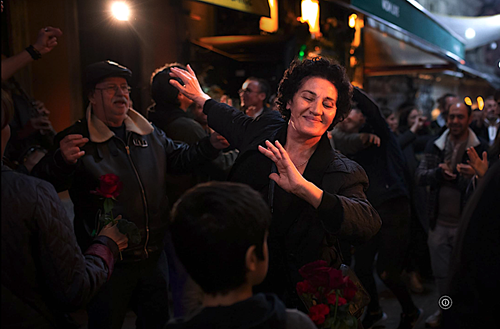
The most subtle yet significant permeable boundary here is the one separating lie from truth, fantasy from reality. The plot of Crossing hinges on multiple cases of mistaken identity and false pretense that led serendipitously to epiphany, especially for Lila. The most consequential of these is Achi’s lie that he has Tekla’s address, and how it steers Lia and him in the direction of Evrim. At one point, as Lia considers the possibility that Tekla may not want to be found, she speculates that this city is also a place where people come to disappear. In tracing the journey of this older Georgian woman from a place of ignorance, fear, and neglect and to one of relative self-awareness and acceptance, Crossing succeeds in showing trans people as real human beings and deserving of love.





